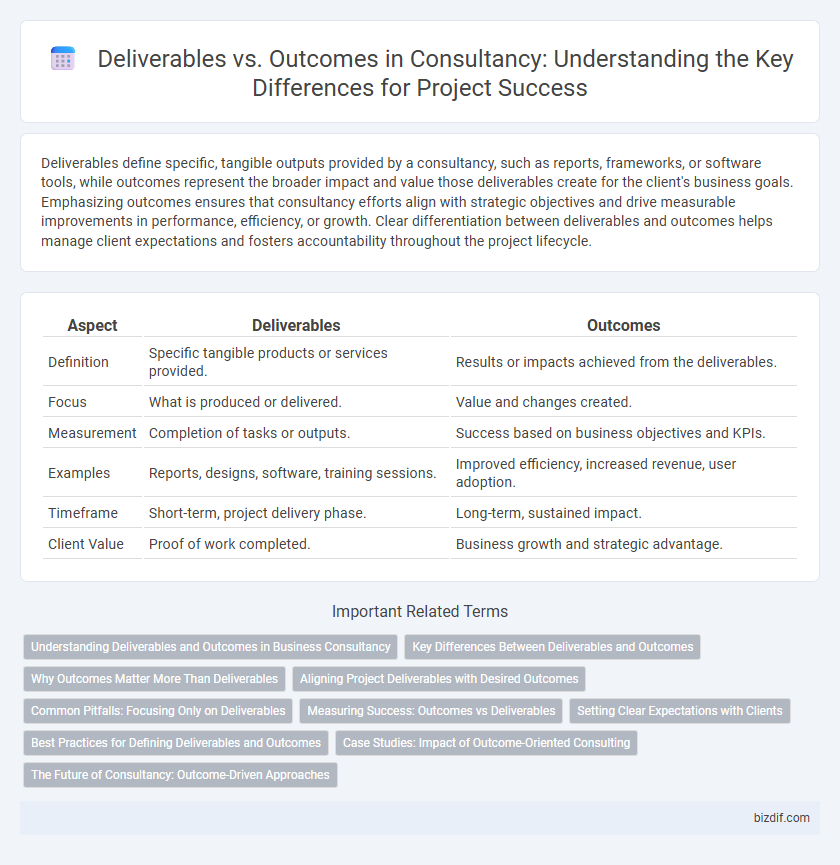Deliverables define specific, tangible outputs provided by a consultancy, such as reports, frameworks, or software tools, while outcomes represent the broader impact and value those deliverables create for the client's business goals. Emphasizing outcomes ensures that consultancy efforts align with strategic objectives and drive measurable improvements in performance, efficiency, or growth. Clear differentiation between deliverables and outcomes helps manage client expectations and fosters accountability throughout the project lifecycle.
Table of Comparison
| Aspect | Deliverables | Outcomes |
|---|---|---|
| Definition | Specific tangible products or services provided. | Results or impacts achieved from the deliverables. |
| Focus | What is produced or delivered. | Value and changes created. |
| Measurement | Completion of tasks or outputs. | Success based on business objectives and KPIs. |
| Examples | Reports, designs, software, training sessions. | Improved efficiency, increased revenue, user adoption. |
| Timeframe | Short-term, project delivery phase. | Long-term, sustained impact. |
| Client Value | Proof of work completed. | Business growth and strategic advantage. |
Understanding Deliverables and Outcomes in Business Consultancy
Deliverables in business consultancy refer to concrete, tangible products or outputs such as reports, strategy documents, or software implementations provided to clients. Outcomes represent the broader impact or value generated from these deliverables, including improved efficiency, revenue growth, or customer satisfaction. Understanding the distinction between deliverables and outcomes enables consultants to align project execution with clients' strategic goals and measure success beyond mere output delivery.
Key Differences Between Deliverables and Outcomes
Deliverables are tangible, concrete products or services provided at the end of a project, such as reports, software, or blueprints, whereas outcomes represent the measurable impact or changes resulting from those deliverables, like increased efficiency or revenue growth. Deliverables focus on completion and output, while outcomes emphasize value, effectiveness, and long-term benefits. Understanding the distinction between these helps consultancies align project goals with client expectations by prioritizing both delivery milestones and strategic results.
Why Outcomes Matter More Than Deliverables
Outcomes matter more than deliverables because they directly reflect the value and impact of consultancy services on business goals, driving strategic change beyond mere task completion. Deliverables are tangible outputs, but outcomes measure effectiveness through improved performance, customer satisfaction, and return on investment. Prioritizing outcomes ensures consultancy efforts align with client success and long-term organizational growth.
Aligning Project Deliverables with Desired Outcomes
Aligning project deliverables with desired outcomes requires a clear understanding of client objectives and success metrics. Effective consultancy emphasizes translating deliverables into measurable business value by continuously monitoring progress against outcomes. This alignment ensures that project outputs drive strategic goals and maximize return on investment.
Common Pitfalls: Focusing Only on Deliverables
Focusing only on deliverables in consultancy often leads to overlooking the actual outcomes that drive client value and long-term success. This tunnel vision can result in meeting project milestones without addressing underlying business challenges or measuring impact effectively. Consultants must prioritize outcome-based metrics and stakeholder alignment to ensure deliverables translate into meaningful, sustainable improvements.
Measuring Success: Outcomes vs Deliverables
Measuring success in consultancy relies on evaluating outcomes rather than just deliverables, as outcomes reflect tangible business impact and client value. Deliverables are specific project outputs, but outcomes demonstrate how those outputs improve key performance indicators like ROI, customer satisfaction, or process efficiency. Focusing on outcomes ensures alignment with strategic goals and drives continuous improvement beyond mere task completion.
Setting Clear Expectations with Clients
Setting clear expectations with clients involves distinguishing between deliverables and outcomes to ensure alignment and satisfaction. Deliverables are tangible, specific outputs such as reports or project plans, while outcomes represent the broader impact or benefits achieved through those deliverables. Clarifying this difference upfront helps manage client expectations, facilitates transparent communication, and drives successful project completion.
Best Practices for Defining Deliverables and Outcomes
Clearly defining deliverables and outcomes in consultancy projects enhances client satisfaction and project success by establishing measurable goals and expectations. Best practices include aligning deliverables with strategic outcomes, using specific metrics to track progress, and ensuring all stakeholders have a shared understanding of both tangible products and business impacts. Documenting detailed scopes and regularly reviewing deliverables against expected outcomes helps mitigate risks and ensures continuous alignment throughout the project lifecycle.
Case Studies: Impact of Outcome-Oriented Consulting
Case studies in outcome-oriented consulting demonstrate a measurable shift from traditional deliverable-based approaches to focusing on business impact and value creation. By aligning consulting efforts with client-specific results such as revenue growth, operational efficiency, or customer satisfaction improvements, firms can showcase quantifiable success stories that validate their strategic recommendations. This results-driven strategy enhances client trust and long-term partnership potential by emphasizing tangible outcomes over generic deliverables.
The Future of Consultancy: Outcome-Driven Approaches
Outcome-driven consultancy prioritizes measurable business results over traditional deliverables, aligning strategies with client success metrics to ensure tangible impact. This shift empowers consultants to innovate continuously, fostering adaptive solutions that respond to evolving market demands. Emphasizing outcomes transforms consultancy from transactional service delivery into a strategic partnership driving sustainable growth.
Deliverables vs Outcomes Infographic

 bizdif.com
bizdif.com